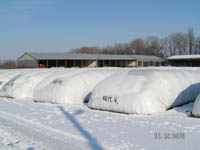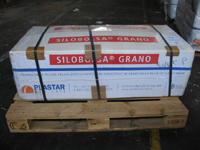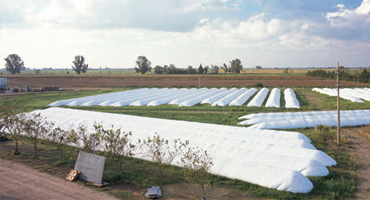
Description of image can be put here.
All Agriculture products:
Silo bags
Flex-Pack is the exclusive importer/distributor of Silobolsa® bags from Plastar S.A. in Argentina. More than 220.000 bags are sold in Argentina each year making it the biggest market for silo bags in the world. Plastar produces around 100.000 bags per year and sells these bags all over the world. All the Silobolsa® 3-layer co extrusion bags are made with high-quality Dow Chemical resins. The Plastar silage bags, grain bags and elastic tubes have been used successfully by farmers storing their crops for over 10 years.
Flex-Pack has been successfully marketing the Silobolsa® bags in Europe since 2002. Our bags are now being used throughout Europe. Together with our customers we are working on gradually increasing our customer base. We understand that only the quality of our products and the level of our service will generate acceptance with the end users. An average silo bag can store € 25.000 worth of product so there is no room for error.
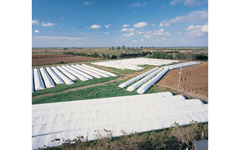
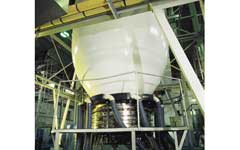
Silage bags
Silage bags are very effective for preserving f.e. corn, alfalfa, barley, grass, sugar beet pulp, brewer’s grain and other by-products with minimum nutrient loss. The anaerobic environment that is created eliminates spoilage from the growth of yeasts, moulds and adverse bacteria while maintaining essential proteins and nutrients. It is one of the lowest costs per tonne storage systems available. The high quality feed that is preserved in the Silage bag will produce greater beef and dairy profits and provide a high return on a low capital investment. The bagging machine is the only added capital expense required. This capital expense is generally less than a concrete pit or an upright silo. Silage bags allow you to store your silage anywhere you need it. A well graded and well drained ground surface is all that is necessary. In most cases no cement pad is required. The silage can be fed mechanically with a front end loader or self-fed when using a feeder gate.
Silobolsa® silage bags are available in Black/White 3-layer co extrusion polyethylene film. The standard sizes of our bags are 6,5′, 7′, 8′, 9′, 10′, and 12′ diameters (1,95 m, 2,10 m, 2,40 m, 2,70 m, 3,00 m, and 3,50 m). The standard lengths are 30, 45, 60, 75 and 90 mtr. Custom lengths, gauge or UV protection are available upon special request. All bags come in strong boxes which are sealed in protective plastic film. Each box contains 1 roll of white tape and 2 PE closing strips.
Specifications of most common sizes:
| Diameter Feet | Layflat size | Length / Meters | gauge | Capacity / tons. |
| 6.5 | 3.15 mtr. | 60 | 180 micron | 110/120 |
| 7 | 3.30 mtr. | 60 | 180 micron | 130/140 |
| 8 | 4.00 mtr. | 60 | 200 micron | 160/170 |
| 9 | 4.35 mtr. | 60 | 200 micron | 200/210 |
| 9 | 4.35 mtr. | 75 | 240 micron | 240/250 |
| 10 | 4.85 mtr. | 60 | 210 micron | 240/250 |
Grain Bags
A. Dry grains
Over the last decade new technology has allowed for the invention and acceptance of the Grain Bagging System which provides grain producers and grain companies with a temporary, economical storage site for their dry grain crop f.e. corn, soybean, wheat, sunflower, rice, etc., (12 – 15% moisture).
Every year grain producers are subject to adverse weather conditions that either delay or postpone harvest. During wet years, the storage of tough grain (>15% moisture) can lead to spoilage when stored in conventional grain silos or warehouses. This spoilage translates into a loss of palatability or feed refusal by livestock. Since grain bagging creates an oxygen deprived environment, grain is stored in a constant environment. The risks of grain heating are lowered (if not eliminated) because the catalyst that starts heating — oxygen — is deprived.
The Grain Bagging system provides;
- The ability to start harvest earlier
- Maximum use of equipment through longer harvest days
- Less dependence on weather
- Less grain dust during harvest and feeding
- Reduced losses
- Collection of weed seed before shattering
- The ability to harvest green patches
- The ability to preserve the grain until a more convenient time is available for the final delivery, processing or handling of the grain.
Specifications of most common sizes:
| Diameter Feet | Layflat size | Length / Meters | gauge | Capacity / tons. |
| 5 | 2.40 mtr. | 60 | 155 micron | 55/60 |
| 6 | 2.82 mtr. | 60 | 180 micron | 90/100 |
| 9 | 4.35 mtr. | 60 | 240 micron | 200/210 |
| 9 | 4.35 mtr. | 75 | 240 micron | 250/260 |
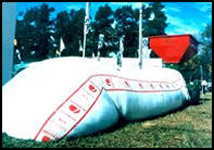
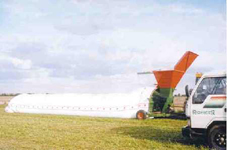
B. High moisture grains
Within the wide range of animal feeding systems, high moisture grains are practically included in all of them. The quality of the obtained material, its manageability, etc, make it a highly appreciated resource for breeders. It is a highly nutritious component which, soundly used and managed, allows to improve diets, thus obtaining very good animal fattening or growth yields. It is also a valuable resource for dairy producers, since excellent production and consumption results have been obtained in dairy cows.
The grain bag is an excellent, reliable system for the ensilage and storage of high moisture grain crops (>18% moisture). High moisture grain ensilage has a number of advantages that make it very convenient and competitive against other systems. For that reason, this system has reached major developments.
- Harvests can be started 30 to 45 days earlier, depending on the crop and desired moisture degree.
- Reduced harvesting problems because it breaks the end of the cycle’s weed cycle.
- Reduced losses resulting from bird attacks. This is particularly advantageous for non-or low-tannin sorghum crops because it allows harvesting before crops are attacked by birds, or before they may sprout due to excessive environmental humidity.
- Earlier pasture clearing. It allows establishing different crop rotations which are different from the traditional ones.
- Availability of already ground or crushed material, close to the consumption site to be directly supplied to animals.
Harvesting is made when the grain reaches a moisture degree ranging from 28% to 35%. The choice will depend on the machine used, the time of the year, the crop, and the grain’s final destination.
Specifications of most common sizes:
| Diameter Feet | Layflat size | Length / Meters | gauge | Capacity / tons. |
| 4 | 2.15 mtr. | 60 | 210 micron | 45/50 |
| 5 | 2.40 mtr. | 60 | 210 micron | 55/60 |
| 6 | 2.82 mtr. | 60 | 210 micron | 90/100 |
Downloads
Grain and silage english manual.pdf
Brochure silo bags.pdf
Red camel project Sudan
Brochure Deutsch, Polski, Pyccknn
Brochure Espanol, English, Francais

 English
English  Dutch
Dutch 